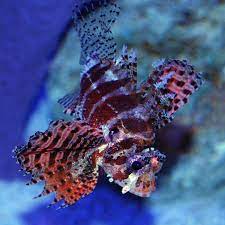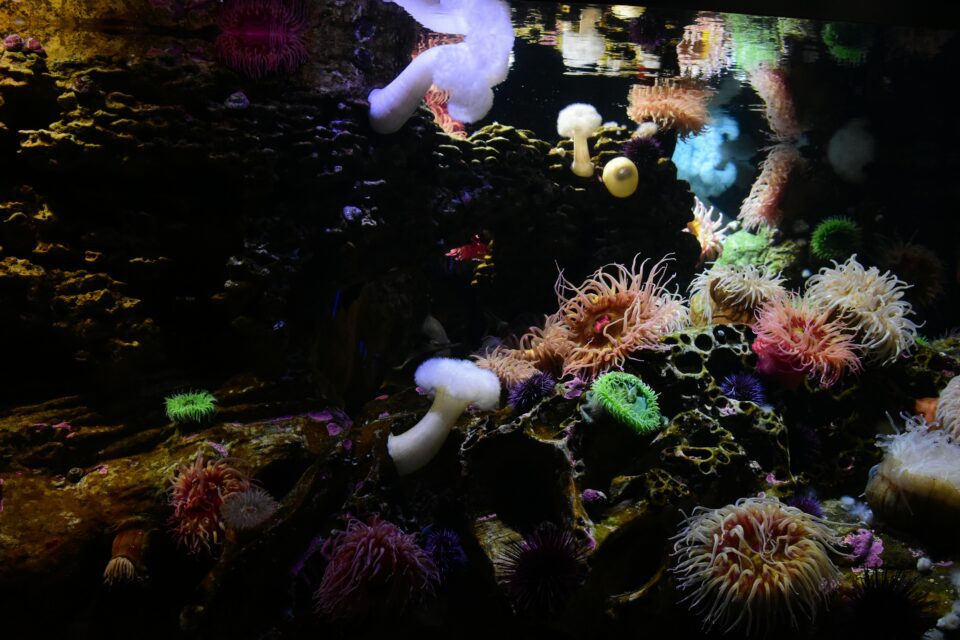Fuzzy Dwarf Lionfish (Dendrochirus brachypterus) are intriguing and visually striking additions to reef aquariums. In this comprehensive guide, we’ll dive into the world of Fuzzy Dwarf Lionfish, covering their appearance, habitat preferences, care requirements, feeding tips, compatibility in reef tanks, and why they are widely considered the only reef-safe lionfish species.

Understanding Fuzzy Dwarf Lionfish:
- Appearance: Fuzzy Dwarf Lionfish are known for their unique appearance, featuring elongated dorsal fin rays and a dense covering of bristly appendages resembling fuzz, giving them a distinct and captivating look. They come in various color variations, including red, brown, and black, with contrasting stripes and patterns.
- Habitat and Distribution: Fuzzy Dwarf Lionfish are native to Indo-Pacific regions, inhabiting coral reefs, rocky crevices, and lagoon environments. They prefer areas with moderate water flow and hiding spots to ambush prey, showcasing their natural hunting instincts and camouflage abilities.
- Care Requirements: When keeping Fuzzy Dwarf Lionfish in a reef tank, provide a spacious environment with plenty of hiding places and minimal aggressive tankmates. Maintain stable water parameters, including temperature (75-80°F), salinity (1.023-1.025 sg), pH (8.1-8.4), alkalinity (8-10 dKH), and calcium (400-450 ppm), to support their health and well-being.
Feeding Tips for Fuzzy Dwarf Lionfish:
- Transitioning to Prepared Foods: Fuzzy Dwarf Lionfish may initially resist consuming prepared foods, preferring live or frozen prey. Encourage feeding by offering small live feeder fish, shrimp, or frozen mysis shrimp soaked in garlic extract to entice their appetite. Gradually transition to high-quality pellet or frozen foods to ensure a balanced diet.
- Feeding Frequency: Feed Fuzzy Dwarf Lionfish small meals 2-3 times a week, adjusting portion sizes based on their appetite and growth. Monitor feeding behavior and adjust feeding frequency as needed to prevent overfeeding and maintain water quality.
Compatibility in Reef Tanks:
- Reef-Safe Nature: Fuzzy Dwarf Lionfish are widely considered the only reef-safe lionfish species due to their smaller size, gentle temperament, and minimal impact on reef inhabitants. They are generally compatible with a wide range of reef tank inhabitants, including corals, invertebrates, and peaceful fish species.
- Tankmates: Choose tankmates for Fuzzy Dwarf Lionfish carefully, avoiding aggressive or territorial species that may harass or compete with them for food. Compatible tankmates include peaceful reef fish, shrimp, snails, and non-aggressive invertebrates that won’t pose a threat to the lionfish.

Notice:
It’s important to note that while Fuzzy Dwarf Lionfish are considered reef-safe, they still possess venomous spines that can cause painful stings if handled improperly. Handle them with care and avoid contact with their dorsal and pectoral fins to prevent accidental stings.
Conclusion:
Fuzzy Dwarf Lionfish are captivating and relatively reef-safe additions to reef aquariums, showcasing their unique appearance, hunting behavior, and compatibility with a diverse range of tank inhabitants. By providing appropriate care, feeding strategies, and selecting compatible tankmates, aquarists can enjoy the beauty and allure of Fuzzy Dwarf Lionfish while maintaining a thriving and harmonious reef ecosystem. With proper attention to their needs and habitat requirements, Fuzzy Dwarf Lionfish can thrive and become a cherished centerpiece in reef tank displays, captivating observers with their enchanting presence.




